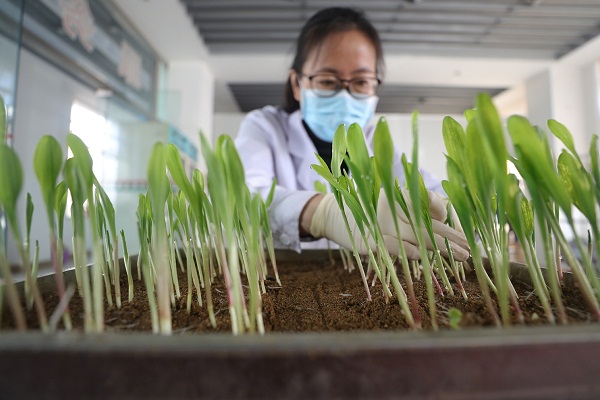
A researcher takes care of corn seedlings at a seed laboratory in Liaoning province, on March 16, 2020. [Photo/Xinhua]
Agronomists in lab and base committed to making more contributions to food security
President Xi Jinping's visit to the seed laboratory in Sanya, Hainan province, has reiterated the importance of the seed industry in China and boosted the confidence of workers in the sector, agricultural scientists said.
China's food security can only be achieved when seed resources are tightly held in Chinese hands, Xi said at the Yazhou Bay Seed Laboratory, underscoring the self-reliance of seed sources and related technology.
Peng Jun, deputy director of the lab, said Xi affirmed achievements made by the seed lab since it was established in May and encouraged them to pass on the spirit of agronomists in making more contributions to the country's food security.
"Xi's visit shows his care for agronomists and expectations for the lab," Peng said.
The seed lab was established for the country to independently cultivate seed varieties with robust performances and break scientific bottlenecks in the seed industry, such as in genetic research and the molecular breeding of soybeans.
The lab is equipped with facilities and personnel engaged in the entire chain of seed breeding, including theoretical innovation, genetic mining and variety industrialization, which involves more than 20 institutions, Peng said.
"President Xi said the lab has made achievements not only in research and development, but also in industrialization. It works on both plants and animal varieties, and the advanced chain has achieved fruitful results," he said.
Covering more than 240,000 square meters, it has built 10 public scientific research platforms.
The lab is in the Nanfan Scientific and Research Breeding Base in the Yazhou Bay area, which has been dubbed China's "Silicon Valley" of agriculture. The base has created more than 70 percent of new crop varieties in the country.
It takes advantage of the tropical climate and biological resources in Hainan and has attracted 8,000 scientists and workers over the years, including the late Yuan Longping, also known as the father of hybrid rice.
The climate in Sanya enables crop varieties to breed up to three generations in a year, shortening more than one-third of the breeding cycle to about five years at the base.
Promoting the establishment of Nanfan breeding base has been included twice in the No 1 Central Document-issued by the Communist Party of China Central Committee and the State Council-since President Xi visited the base in 2018.
Li Zhanshuai, an assistant researcher at the Chinese Academy of Agricultural Sciences' Nanfan Breeding Research Center, said the lab can conduct experiments through the entire research and development chain, including field experiments and molecular design.
Li, a cotton breeding expert, went to the Nanfan base several times to work on the development of new cotton varieties that can tolerate the saline-alkaline and drought conditions of the Xinjiang Uygur autonomous region, the major cotton production area in China.
Li started to work at the lab in June and has been based in Sanya since then, where he has been working on the project with fellow team members. Before the lab was established, he only came to the Nanfan base for field research and conducted molecular experiments in the academy's Cotton Institute in Anyang, Henan province.
The team has made progress in the current project especially since it started working at the lab. "We planned to successfully breed the salt and alkali tolerant variety in a few years and the yield is estimated to increase 5 to 10 percent," Li said.
He said he hoped the country would come to own more seeds with independent property rights.
"I am glad to see the growing significance of the seed industry. I was born in a rural area and people used to underestimate agriculture and had a misunderstanding that seeds are not that important," Li said, adding that the emphasis on the issue from the central leadership has boosted agronomists' confidence.